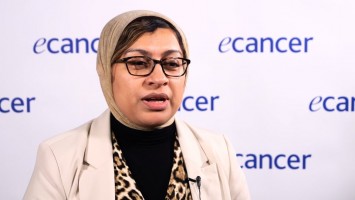KEYNOTE-966 was a randomised phase III trial in advanced biliary tract cancers designed to assess the impact of adding an immunotherapy agent, the immune checkpoint inhibitor pembrolizumab, to standard chemotherapy in this difficult to treat family of cancers. Biliary tract cancers are a complex family of cancers including intra- and extrahepatic cholangiocarcinomas which are cancers of the bile duct arising from either the branches of the bile duct within the liver or the branches of the bile duct outside the liver for intrahepatic and extrahepatic cholangiocarcinoma respectively. Biliary tract cancers also include gallbladder cancers. Overall, these are really difficult to treat cancers that have not responded well to standard chemotherapies with median overall survival generally less than a year with conventional chemotherapy.
The hope is that adding immunotherapy will help people achieve an immune response that allows for a higher number of patients responding but also longer, more durable and meaningful responses from the treatment.
In KEYNOTE-966 patients with advanced stages of biliary tract cancers, including intrahepatic and extrahepatic cholangiocarcinoma as well as gallbladder cancer, who had not received any prior chemotherapy were randomly assigned to receive either standard chemotherapy with gemcitabine plus cisplatin combined with an immune checkpoint inhibitor, pembrolizumab, or the same chemotherapy with a placebo agent as the control arm. The primary endpoint was overall survival so the study was designed and powered to determine if the combination with immune therapy with pembrolizumab achieved a survival benefit compared to the same chemotherapy with placebo.
What were the results?
The KEYNOTE-966 trial enrolled 1,069 patients, making it the largest phase III trial in the history of biliary cancer to date. In this phase III trial the median overall survival for the combination arm of chemotherapy with pembrolizumab was 12.7 months compared to 10.9 months for the combination with placebo, which achieved statistical significance with a hazard ratio of 0.84 and a p-value of 0.0034. This indicated that adding immunotherapy with pembrolizumab does meaningfully improve survival overall.
Importantly, from a clinician perspective, when we looked at specific milestone timepoints, meaning the proportion of patients still alive at 12 months and 24 months, which are things we really care about in the clinic, we saw that the arm with immunotherapy with pembrolizumab had substantially higher proportions of patients surviving at both 12 months and 24 months. At 24 months the proportion with survival in the immunotherapy arm was 25% compared to 18% for the placebo arm at that same timepoint.
How do you think these results can impact future research and treatment?
These results tell us that adding an immune checkpoint inhibitor with pembrolizumab can increase the chances of our immune system helping chemotherapy to achieve a response and that these responses can be long lasting, as indicated by those 24-month milestone timepoint results. By all means these results are not the end of the story; we absolutely need to do better. So what I hope is that these results will help us to learn how to harness combinations of chemotherapy and immune checkpoint inhibitors even better down the road to achieve higher proportions of patients with survival at certain timepoints and a longer median overall survival for everybody with this difficult family of cancers on the rise.
What that might look like are potentially combinations of different types of immune checkpoint inhibitors with chemotherapy. We’re also studying different types of chemotherapy, not only in the first line but also either later in the second or third line if patients don’t respond to the initial first-line therapy, potentially trying a different type of immune checkpoint inhibitor, or combinations thereof, with different chemotherapies, or potentially also looking at these combinations earlier in the adjuvant setting, noting that patients do have a high chance of recurrence after curative surgery with this cancer and need better therapies earlier in the game as well.








